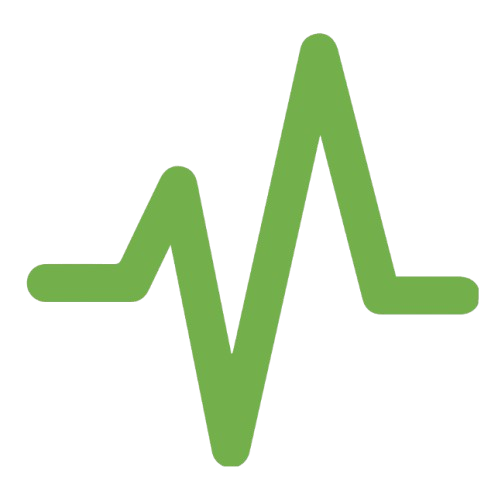
Women’s Health Vitamins: A Practical Guide for Every Stage of Life
Share
When it comes to nutrition, a one-size-fits-all approach just doesn't cut it. That's why getting to grips with the best women's health vitamins is so crucial for feeling your best long-term. From navigating hormonal cycles to keeping bones strong through every decade, a woman's body has unique, shifting demands that need the right kind of support. This practical guide will walk you through the essential nutrients you need to thrive.
Why Do Women Have Different Nutritional Needs?
Think of a woman's body like a high-performance engine that needs different types of fuel depending on the journey. Whether it's the monthly rhythm of a menstrual cycle, the incredible demands of pregnancy, or the transition through menopause, each stage comes with its own set of nutritional rules. Standard, generic advice often completely misses these vital details.
This biological blueprint means certain vitamins and minerals become front and centre at specific times. For instance, the nutrients you need in your reproductive years are worlds away from what’s required to maintain bone strength and energy after menopause.
The Impact of Life's Stages
At the heart of a woman's health journey are hormonal fluctuations. These chemical messengers have a direct say in how your body absorbs and uses nutrients, which makes targeted supplementation a smart way to stay in balance.
Key stages that really switch up your nutritional needs include:
- Menstruation: Losing blood every month can put you at risk of iron deficiency, which is a classic culprit behind fatigue and low energy.
- Pregnancy and Breastfeeding: Your nutrient needs go through the roof to support both you and your growing baby. Folate and iron become non-negotiable.
- Perimenopause and Menopause: As oestrogen levels change, bone density can take a hit, making calcium and vitamin D your best friends for preventing osteoporosis.
Taking a proactive approach to your nutrition means you can support your body’s specific needs before a deficiency even has a chance to develop. When you understand these shifts, you can make choices that promote hormonal harmony, stronger bones, and steady energy.
It's a growing awareness we're seeing right across the UK as more women look for targeted health supplements. In fact, the UK women's health and beauty supplements market is set to grow at a compound annual rate of 6% from 2025 to 2030. This is largely driven by a better understanding of how nutrient gaps affect women during key life stages. You can learn more about the UK women's health supplement market trends and their key drivers.
At the end of the day, acknowledging these unique requirements is the first step to building a strong foundation for lifelong health. Personalised nutrition, including the right women's health vitamins, isn't a luxury—it’s a necessity for feeling great through every chapter of life.
The Foundational Four: Core Vitamins Every Woman Needs
Think of your health like building a house. You need a solid foundation before you can even think about the paint colours or fancy fixtures. In nutrition, that foundation is built with a handful of essential vitamins and minerals that are non-negotiable for women’s health. They’re the core team working behind the scenes, day in and day out, to keep your body’s intricate systems running smoothly. Let’s get to know four of the most critical players.
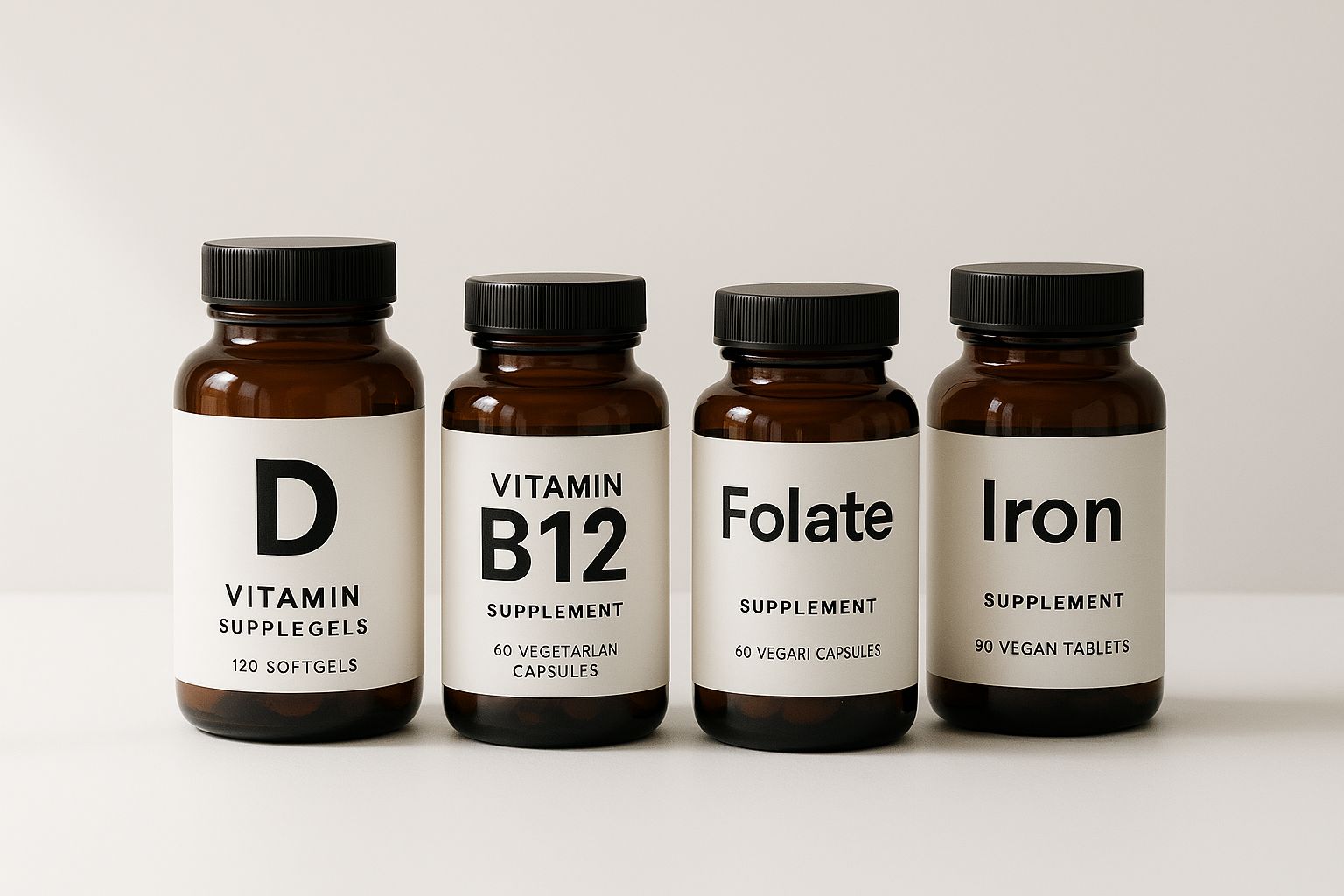
Vitamin D: The Sunshine Vitamin
We often hear Vitamin D called the "sunshine vitamin," and while it’s a great mood-booster, its most vital job is helping your body absorb calcium. Without it, you can’t build or maintain strong bones. In fact, without enough Vitamin D, your body can only hang on to about 10% to 15% of the calcium you get from your food.
This is a huge deal for women, who are naturally at a higher risk of developing osteoporosis as they get older. But it’s not just about bones. Growing research also links healthy Vitamin D levels to better immune function and even hormone regulation.
Of course, our bodies can make Vitamin D from the sun, but let’s be realistic. Living in the UK, slathering on sunscreen (as we should!), or having darker skin can all get in the way of producing enough.
Iron: The Energy Transporter
Picture iron as your body’s personal oxygen courier service. It’s a key part of haemoglobin, the protein in your red blood cells that zips oxygen from your lungs to literally every other cell in your body. When you’re low on iron, that delivery service grinds to a halt, leaving you with that familiar, dragging feeling of fatigue.
Women are especially prone to iron deficiency, mainly because of blood loss during menstruation. That monthly cycle means women of reproductive age need nearly twice as much iron as men to keep their levels topped up.
Signs you might be running low include:
- Constant tiredness and zero energy
- Getting out of breath easily
- Pale skin
- Brain fog or trouble concentrating
Top tip: To get more iron from plant-based foods like spinach or lentils, just add some Vitamin C. A simple squeeze of lemon or a few slices of bell pepper on the side can make a massive difference to how much your body absorbs.
Folate: The Reproductive Health Hero
Folate, also known as Vitamin B9, is the ultimate champion of cell growth and development. It’s most famous for its starring role during pregnancy, where it’s essential for preventing major birth defects in a baby’s brain and spine.
Because so many pregnancies are unplanned, it’s recommended that all women of childbearing age make sure they’re getting enough folate. But its job doesn’t stop at pregnancy. Folate is crucial for making red blood cells and keeping all your cells functioning healthily throughout your entire life.
You can find it in plenty of delicious foods, such as:
- Leafy greens like spinach and kale
- Legumes like beans, peas, and lentils
- Fortified cereals and breads
- Avocados and citrus fruits
Vitamin B12: The Nerve and Brain Protector
Vitamin B12 is the unsung hero working tirelessly to protect your nervous system and brain. It’s responsible for maintaining the health of your nerve cells and is a critical ingredient for creating DNA. Working alongside folate and iron, it’s also a key player in producing healthy red blood cells.
When you don’t get enough B12, you can develop a type of anaemia that brings on fatigue and weakness. Over time, a real deficiency can even lead to nerve-related symptoms like numbness, tingling, or memory problems.
Since Vitamin B12 is found almost entirely in animal products, women who follow a vegetarian or vegan diet are at a much greater risk of falling short and should seriously consider a supplement. B12 is a vital member of the B-vitamin family—you can get to know the whole crew in our guide on what is the vitamin B complex good for.
To help you keep these foundational four straight, here’s a quick-glance table summarising what you need to know.
Essential Vitamins for Women at a Glance
| Vitamin | Key Benefit for Women | Rich Food Sources |
|---|---|---|
| Vitamin D | Crucial for calcium absorption and building strong bones, reducing osteoporosis risk. | Fatty fish (salmon, mackerel), fortified milk, egg yolks, sun exposure. |
| Iron | Transports oxygen to cells, preventing fatigue and anaemia common due to menstruation. | Red meat, poultry, fish, lentils, spinach, fortified cereals. |
| Folate (B9) | Essential for preventing birth defects and supports healthy cell growth. | Leafy greens, avocados, beans, lentils, fortified grains. |
| Vitamin B12 | Protects nerve cells, supports brain function, and helps form red blood cells. | Meat, fish, poultry, eggs, dairy products (primarily animal-based). |
These four nutrients are the bedrock of good health, supporting everything from your energy levels and mood to your bone strength and long-term wellbeing.
Adapting Your Nutrients Through Life Stages
A woman's nutritional needs aren't a fixed destination; they're a dynamic journey. The vitamins and minerals that keep you thriving in your twenties will look quite different from what your body is asking for in your fifties and beyond. Understanding these shifts is key to proactively tailoring your intake, ensuring you’re giving your body the right fuel for every chapter of life.
This infographic gives a great snapshot of the Recommended Daily Intake (RDI) for three crucial nutrients—Vitamin D, Iron, and Folate—that play a massive role throughout a woman's life.
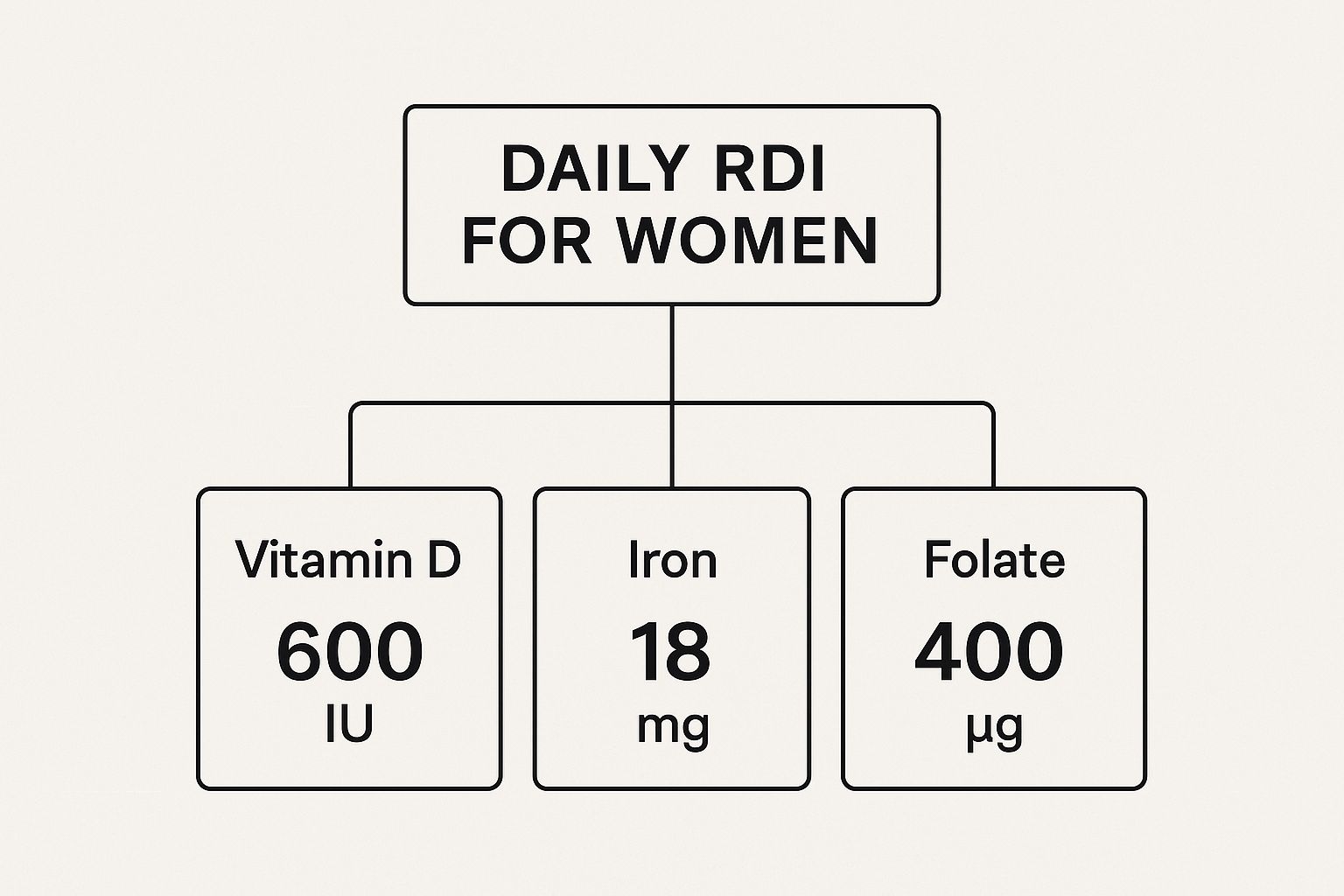
You can see how these foundational nutrients are prioritised for women’s general health. They form a baseline that then needs a bit of a tweak during specific life phases.
Your Reproductive Years
During your reproductive years, your monthly cycle places some unique demands on your body, especially when it comes to iron. That regular loss of blood can easily lead to depleted iron stores, which is a major reason why fatigue is so common among women in this age group. Keeping your iron levels topped up is absolutely vital for energy, focus, and overall vitality.
Alongside iron, folate (Vitamin B9) is another non-negotiable. It's essential for cell growth and is particularly important for women who might become pregnant, as it plays a critical role in preventing neural tube defects in a developing baby. For a deeper dive into how iron teams up with other key vitamins, you might find our guide on the importance of iron and B 12 supplement helpful.
Pregnancy and Breastfeeding
Pregnancy and breastfeeding are easily the most nutritionally demanding times in a woman's life. Your requirements for just about every essential vitamin and mineral shoot up to support both your own health and the rapid growth of your little one.
Key nutrients that need a major boost include:
- Folate: Demand skyrockets to support foetal development.
- Iron: Needed to support your increased blood volume and get oxygen to the baby.
- Calcium: Absolutely crucial for building the baby’s skeleton. If your intake is too low, your body will start pulling calcium from your own bones.
- Vitamin D: Works hand-in-hand with calcium to support bone development and immune function.
- Omega-3 Fatty Acids (DHA): Essential for the baby's brain and eye development.
This is a time when a high-quality prenatal multivitamin becomes an indispensable part of your daily routine.
Perimenopause and Menopause
The transition into menopause brings a significant hormonal shift, mainly a drop in oestrogen. This change has a direct impact on your nutritional needs, especially when it comes to bone health and managing those tell-tale symptoms.
As oestrogen levels fall, the rate of bone loss speeds up, making women much more susceptible to osteoporosis. This is the stage where protecting your bone density becomes a top priority.
Calcium and Vitamin D become your two best mates for maintaining a strong skeleton. They work as a team; Vitamin D is necessary for your body to properly absorb the calcium you consume. What's more, magnesium can be a game-changer during this phase, as it may help ease common symptoms like poor sleep, anxiety, and muscle cramps.
Post-Menopause and Beyond
After menopause, the focus shifts towards long-term health—particularly maintaining bone density, supporting cognitive function, and preserving muscle mass. The risk of osteoporosis remains high, so a consistent intake of calcium and Vitamin D is still critical. Adults over 70 often need more Vitamin D—around 800 IU daily—as our skin becomes less efficient at producing it from sunlight.
Furthermore, certain B vitamins, especially Vitamin B12, become more important. As we age, our ability to absorb B12 from food can decrease, and keeping levels up is vital for brain health and nerve function. Supporting your body with the right women's health vitamins in these later years is key to promoting vitality and longevity.
By adapting your nutrient intake to match your life stage, you can effectively address your body’s changing needs, paving the way for sustained health and well-being.
Targeted Supplements for Modern Wellness
Once you’ve got the essential vitamins down, you can start looking at other supplements to help fine-tune your health. Think of these as specialists you call in for specific jobs—whether that’s helping you manage stress, sharpen your focus, or get more out of your workouts. They offer a much more personal way to tackle the wellness challenges so many of us face today.
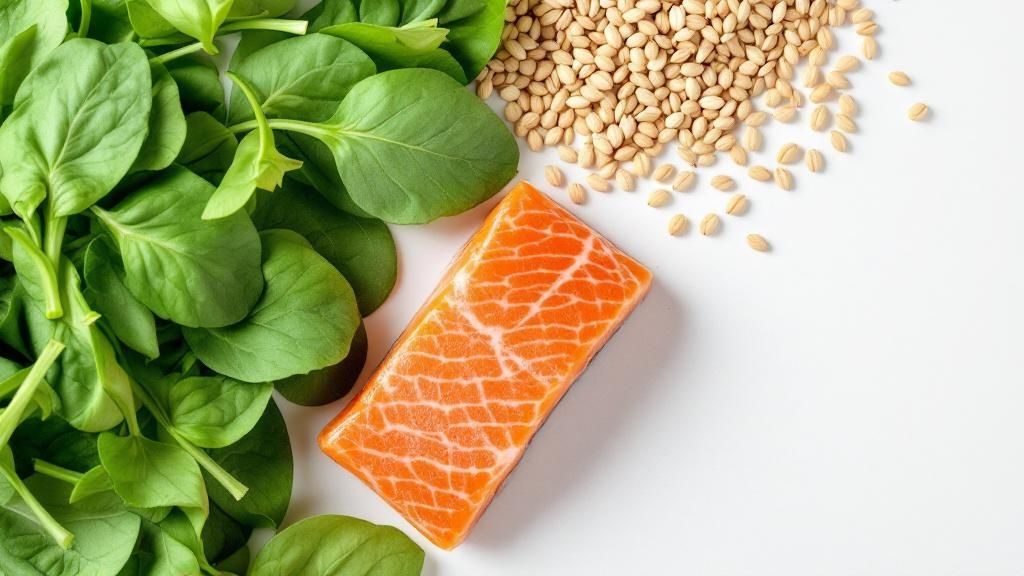
This proactive approach to health is definitely catching on. The UK has seen a huge rise in women using dietary supplements, driven by a growing desire to take preventative care into our own hands. The market was valued at USD 4.79 billion in 2024 and is expected to hit USD 9.65 billion by 2033, which just goes to show how many people are investing in their well-being. You can read the full research about the UK dietary supplements market.
Magnesium for Stress and Sleep
Magnesium is a true multi-tasker, playing a part in over 300 different reactions in the body. One of its most celebrated roles is its ability to calm the nervous system, helping to regulate the neurotransmitters that tell our bodies it’s time to relax. This makes it a powerful ally against stress and anxiety.
When you’re stressed, your body actually burns through its magnesium stores more quickly. This can create a vicious cycle where low magnesium makes you feel more stressed, which in turn depletes your magnesium even further. Supplementing can help break this pattern.
On top of that, magnesium is brilliant for improving sleep quality. It helps your mind switch off and contributes to deeper, more restorative rest—a cornerstone of any wellness routine.
Omega-3s for Brain and Heart Health
Omega-3 fatty acids, especially the EPA and DHA you find in fish oil, are absolutely vital for your brain and heart. Your brain is nearly 60% fat, and a huge chunk of that is DHA, which is essential for keeping your brain cells healthy and communicating effectively.
For women, a consistent intake of omega-3s can support:
- Mood balance: Research suggests a clear link between healthy omega-3 levels and better mood regulation.
- Heart health: They help maintain healthy blood pressure and triglyceride levels.
- Reduced inflammation: Omega-3s have natural anti-inflammatory properties that can benefit your whole body.
Since our bodies can’t produce these fats very well on their own, it’s crucial to get them either from your diet (think fatty fish like salmon) or a high-quality supplement.
Ashwagandha for Cortisol Management
In our fast-paced world, managing stress is more important than ever. Ashwagandha, an ancient herb, is a well-known adaptogen—a natural substance that helps the body adapt to stress. It primarily works by helping to regulate cortisol, the body's main stress hormone.
Chronically high cortisol levels can lead to fatigue, weight gain, and hormonal imbalances. By helping to moderate this response, ashwagandha can promote a sense of calm and resilience.
For women looking to get a handle on modern wellness challenges, exploring the benefits of adaptogens as targeted supplements can be a real game-changer. It’s a natural way to support your body’s ability to cope with daily pressures.
Creatine for Strength and Cognition
Often mistaken as a supplement just for male bodybuilders, creatine actually offers incredible benefits for women, too. It’s one of the most researched supplements out there and is proven to enhance muscle strength and power by helping your body produce energy during high-intensity exercise.
But its benefits don't stop at the gym. New research shows that creatine also plays a role in brain health, potentially improving short-term memory and reasoning skills. For active women looking to boost both physical and mental performance, creatine is a safe and effective option.
To make things a bit clearer, here’s a quick comparison of these powerful supplements and what they’re best for.
Targeted Supplements for Common Women's Health Goals
| Supplement | Primary Health Goal | Best For |
|---|---|---|
| Magnesium | Stress reduction and improved sleep | Women experiencing stress, anxiety, or poor sleep quality. |
| Omega-3s | Brain and heart health | Supporting cognitive function, mood, and cardiovascular wellness. |
| Ashwagandha | Cortisol and stress management | Individuals dealing with chronic stress and seeking hormonal balance. |
| Creatine | Muscle strength and cognitive performance | Active women looking to enhance fitness results and mental sharpness. |
Deciding which to take really comes down to your individual needs and what you’re hoping to achieve.
How to Choose High-Quality Supplements
Walking into the supplement aisle can feel like stepping into a maze. With countless bottles all promising better health, knowing which women's health vitamins are genuinely effective—and which are just clever marketing—can be a real challenge. The key is to become a savvy consumer by learning how to read beyond the front label.
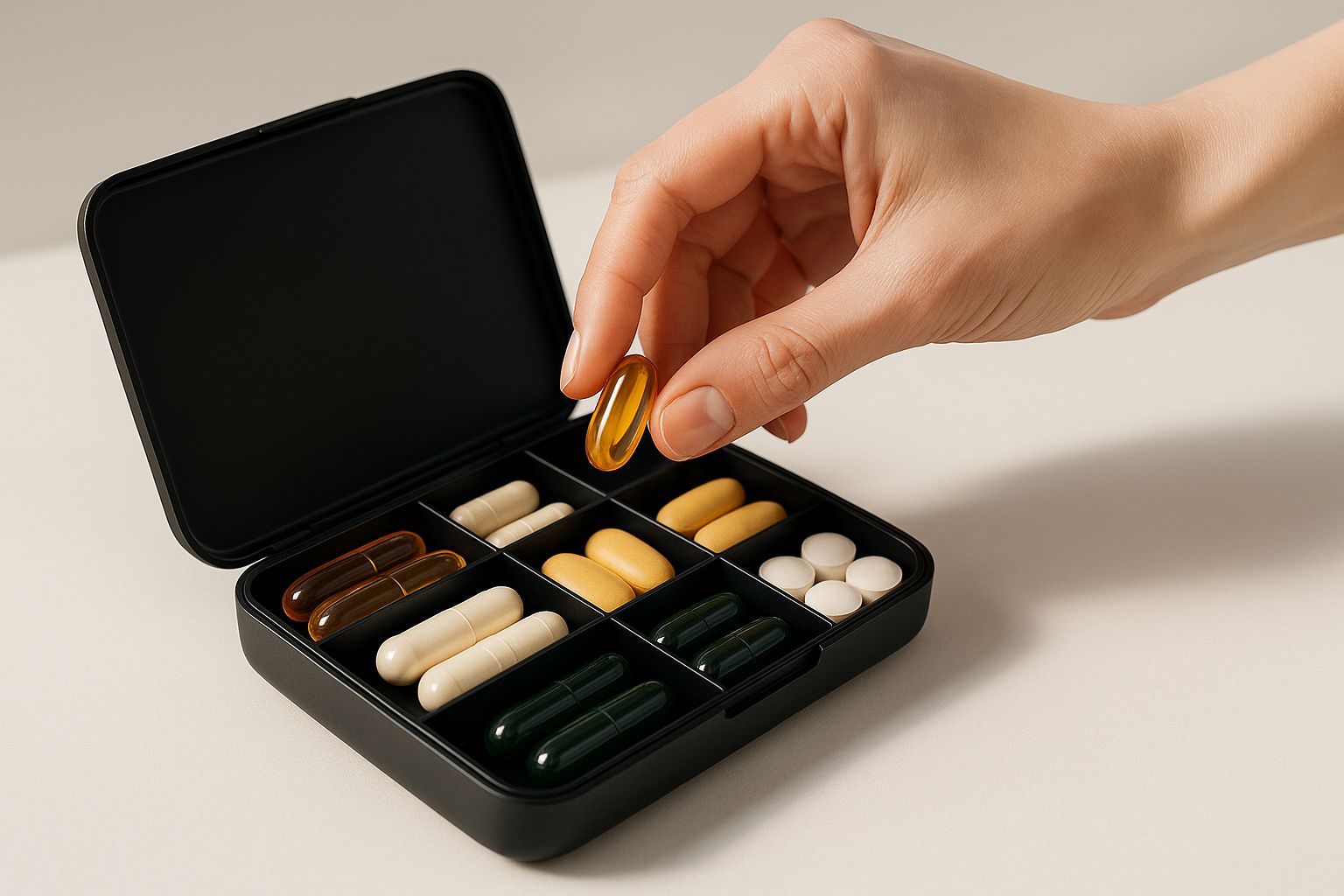
This skill is more important than ever. The global women's health supplement market was valued at a massive USD 163.5 billion as of 2025. Here in the UK, the market is strengthened by clear regulatory guidelines that build consumer trust, which helps explain its continued growth through e-commerce and brand collaborations with healthcare providers.
Look for Third-Party Testing
The first sign of a quality supplement is a seal from a third-party testing organisation. Because the supplement industry isn't as strictly regulated as pharmaceuticals, this independent verification is your best assurance of quality and safety.
Keep an eye out for logos indicating certifications such as:
- GMP (Good Manufacturing Practices): This ensures the product was produced in a clean, controlled environment and that it actually contains what it says it does.
- NSF International or USP (U.S. Pharmacopeia): These seals confirm the product's purity, potency, and overall quality.
These certifications mean an independent body has checked the product for contaminants and verified that the ingredients listed on the label are accurate. It’s a simple check that offers huge peace of mind.
Understand Bioavailability and Vitamin Forms
Not all vitamin forms are created equal. The bioavailability of a nutrient—which is just a fancy way of saying how well your body can absorb and use it—is critical. A supplement isn't much good if the active ingredient just passes straight through you.
A classic example is magnesium. Magnesium citrate is generally well-absorbed and great for relaxation, whereas magnesium oxide has lower bioavailability and is more often used for its laxative effect. This is why reading the fine print on the "Supplement Facts" panel really matters. To get a better handle on what your body needs in the first place, it's worth getting to grips with your current diet; you can explore various nutrition tracking apps to see where you might be falling short.
Think of it like choosing fuel for your car. You wouldn't put diesel in a petrol engine. Similarly, choosing the most bioavailable form of a vitamin ensures your body's "engine" can actually use the fuel you’re giving it.
Avoid Unnecessary Fillers and Additives
Always have a quick scan of the "Other Ingredients" list. The best supplements keep this list short and sweet. Be wary of products packed with unnecessary fillers, artificial colours, sweeteners, and binders like magnesium stearate or titanium dioxide.
These additives offer no health benefit and can sometimes cause digestive upset or even allergic reactions. A clean label is a good indication that the company has prioritised the purity and potency of the active ingredients. If you're looking for a daily supplement, our guide on choosing the best multivitamin for women offers more tips on finding a clean and effective formula.
By checking for third-party testing, understanding bioavailability, and avoiding unnecessary fillers, you can confidently navigate the crowded supplement market and choose products that will genuinely support your health.
Got Questions About Women's Vitamins? We've Got Answers.
When it comes to vitamins, it's totally normal to have a lot of questions. Diving into the world of supplements can feel a bit overwhelming, but getting straight answers is the key to making choices you can feel good about. Let's tackle some of the most common queries and clear up the confusion.
Can I Get All My Vitamins From My Diet Alone?
In an ideal world, we'd get every single nutrient we need from a perfectly balanced diet. The reality, for most of us, is a bit more complicated. Modern farming can sometimes mean our food isn't as nutrient-packed as it once was, and let's be honest, our busy lives don't always leave room for perfectly planned, home-cooked meals every single day.
A few things can create those little nutritional gaps:
- Dietary Choices: If you’re following a vegan or vegetarian diet, you might be at a higher risk of a B12 deficiency, since it's mainly found in animal products.
- Life Stages: As we've touched on, big life events like pregnancy and menopause send your need for certain nutrients—like folate, iron, and calcium—skyrocketing, often way beyond what you can get from food alone.
- Health Conditions: Some health issues can mess with how well your body absorbs nutrients, making supplements a necessary helping hand.
While a "food-first" mindset is always the best place to start, think of a high-quality supplement as a brilliant insurance policy, filling in any gaps you can't avoid.
What's the Best Time of Day to Take My Supplements?
The best time to take your vitamins really depends on what you're taking. The most important thing is building a routine you can stick to—consistency is everything! A great rule of thumb is to take your multivitamin with your first meal of the day.
Taking supplements with food can make a huge difference in how well your body absorbs certain nutrients, particularly fat-soluble vitamins like A, D, E, and K. Plus, it can help sidestep any potential stomach upset.
For some specific supplements, timing can make them even more effective:
- B Vitamins: Pop these in the morning. They’re all about energy production and might keep you up if you take them too close to bedtime.
- Iron: This one is best absorbed on an empty stomach, but it can be a bit harsh and cause nausea for some. If that's you, take it with a small amount of food, but just make sure to avoid calcium at the same time, as it can block iron absorption.
- Magnesium: Taking it for its calming, sleep-supporting benefits? An hour or so before bed is your best bet.
Are Gummy Vitamins as Good as Pills?
Gummy vitamins are everywhere, and if you’re not a fan of swallowing pills, they can seem like the perfect answer. And hey, they're definitely better than taking nothing at all. But, there are a few drawbacks to keep in mind.
Gummies often pack in added sugars, artificial colours, and flavourings to make them taste good. More importantly, they aren't always as stable as pills, which means the active ingredients can degrade over time. So, you might not be getting the full dose that's listed on the bottle. They also tend to have fewer nutrients at lower strengths compared to traditional capsules or tablets.
While gummies can be a great starting point, if you're looking for maximum impact and purity for your daily women's health vitamins, pills or powders are generally the more reliable choice.
How Do I Know if I Have a Vitamin Deficiency?
Spotting a vitamin deficiency can be tricky. The symptoms are often frustratingly vague and easily blamed on other things, like stress or a bad night's sleep. Tell-tale signs you might be running low on key nutrients include feeling tired all the time, having brittle hair and nails, brain fog, or getting sick more often than usual.
The only way to know for sure if you have a deficiency is through a blood test from your doctor or another qualified health professional. It's the most accurate way to pinpoint exactly what you're missing and figure out the best way forward. If you think you might have a deficiency, it’s really important to get professional medical advice instead of trying to guess.
Ready to stop guessing and start supporting your health with precision? The VitzAi smart quiz analyses your unique lifestyle and health goals to provide a personalised supplement plan just for you. Find your perfect vitamin match today.
This article is for informational purposes only and is not medical advice. Always consult a qualified health professional before starting any new supplement or major lifestyle change.
